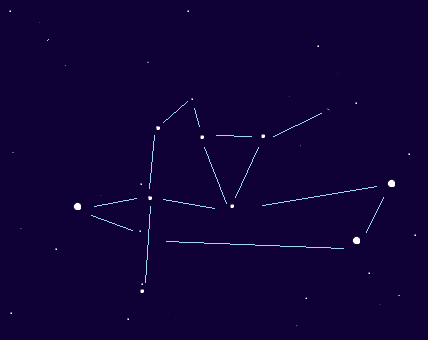Skrell Faith: Difference between revisions
mNo edit summary |
mNo edit summary |
||
| Line 14: | Line 14: | ||
Members of Qeblak come together on a biweekly basis at an '''Observatory Dome'''. It is a structure that tends to exist in urban centres, with the Jargon Federation doing its best to ensure all citizens have reasonable access to. They are typically hosted by Starkeepers, who ensure the maintenance of the dome and host events whereupon members of the community gather for an in-depth demonstration of a galactic entity ranging from stars, planets, nebulae and so on, all using the latest available holographic projects, permitting attendees to experience what is being covered. Many non-Skrell describe the experience as ethereal. | Members of Qeblak come together on a biweekly basis at an '''Observatory Dome'''. It is a structure that tends to exist in urban centres, with the Jargon Federation doing its best to ensure all citizens have reasonable access to. They are typically hosted by Starkeepers, who ensure the maintenance of the dome and host events whereupon members of the community gather for an in-depth demonstration of a galactic entity ranging from stars, planets, nebulae and so on, all using the latest available holographic projects, permitting attendees to experience what is being covered. Many non-Skrell describe the experience as ethereal. | ||
=== Leadership === | === Leadership === | ||
Qeblak is governed by only particular Skrell, those demonstrating extraordinary psionic prowess. It is believed that only the most powerful of psionics are capable of accurately gleaning information from astronomical objects, and translating the information received from them. The clergy, known as the "Qyu-Nyala", is composed of different ranks depicting how far a Skrell is on their journey as religious leaders. | Qeblak is governed by only particular Skrell, those demonstrating extraordinary psionic prowess. It is believed that only the most powerful of psionics are capable of accurately gleaning information from astronomical objects, and translating the information received from them. The clergy, known as the "Qyu-Nyala", is composed of different ranks depicting how far a Skrell is on their journey as religious leaders. | ||
| Line 32: | Line 30: | ||
The Qe'Bqak are the highest-ranking members of Qeblak, and are considered masterful psionic wielders. They study astronomical objects, transcribing them into Lu-Qsi (Abyss Journals). Skrell that receive this position are expected to retire once they believe they have completed their work, with the culture of the Skrell usually resulting in them retaining the position until their death. Qe'Bqak are the only members of the clergy allowed to give advice to the Grand Councillor. | The Qe'Bqak are the highest-ranking members of Qeblak, and are considered masterful psionic wielders. They study astronomical objects, transcribing them into Lu-Qsi (Abyss Journals). Skrell that receive this position are expected to retire once they believe they have completed their work, with the culture of the Skrell usually resulting in them retaining the position until their death. Qe'Bqak are the only members of the clergy allowed to give advice to the Grand Councillor. | ||
=== Holy Prayers of Qeblak === | === Holy Prayers of Qeblak === | ||
==== Miasmic Cluster (Gaqq-qu'ya) ==== | ==== Miasmic Cluster (Gaqq-qu'ya) ==== | ||
| Line 76: | Line 70: | ||
one can all but ask, | one can all but ask, | ||
for protection. | for protection. | ||
=== Marriage & Death === | === Marriage & Death === | ||
Marriage is considerably different for Skrell, as their relationships are typically not as monogamous as the other species found within the Orion Spur. Ancient followers of Qeblak created a ceremony for the joining of various Skrell, eventually calling it the "Pairing of the Stars" or "Quy-aqa", which has survived for thousands of years and evolved to what it is today. The ceremony is considered incredibly intimate, and a sign that the Skrell within the newly forming Quya respect the foundations of the union. The actual planning of the ceremony can take years, with minute details considered highly important to the result of the ceremony. Most will take place within the Observatory Domes, hosted by the same number of Starkeepers as there are Skrell willing to form a union. | Marriage is considerably different for Skrell, as their relationships are typically not as monogamous as the other species found within the Orion Spur. Ancient followers of Qeblak created a ceremony for the joining of various Skrell, eventually calling it the "Pairing of the Stars" or "Quy-aqa", which has survived for thousands of years and evolved to what it is today. The ceremony is considered incredibly intimate, and a sign that the Skrell within the newly forming Quya respect the foundations of the union. The actual planning of the ceremony can take years, with minute details considered highly important to the result of the ceremony. Most will take place within the Observatory Domes, hosted by the same number of Starkeepers as there are Skrell willing to form a union. | ||
| Line 88: | Line 79: | ||
Death is not considered the end by the Skrell; merely a temporary transition between what is here, and what is within the cosmos. Qeblak describes death as being an invitation to join the cosmos, whether as the smallest comet or the largest quasar, all Skrell are said to join those who have already departed. The most common method for post-mortem instructions is burial, so that the body can be reabsorbed back into the environment it stemmed from. | Death is not considered the end by the Skrell; merely a temporary transition between what is here, and what is within the cosmos. Qeblak describes death as being an invitation to join the cosmos, whether as the smallest comet or the largest quasar, all Skrell are said to join those who have already departed. The most common method for post-mortem instructions is burial, so that the body can be reabsorbed back into the environment it stemmed from. | ||
=== Doctrines === | === Doctrines === | ||
The Doctrines of Qeblak, or known as the '''Qrikiqi''', is a set of virtues which constitute the major practices of Qeblak. They are: | The Doctrines of Qeblak, or known as the '''Qrikiqi''', is a set of virtues which constitute the major practices of Qeblak. They are: | ||
| Line 105: | Line 92: | ||
*Nlamo Qrikiqi: Patience, to be patient (Nral'Malic: Nlaq'Wo) | *Nlamo Qrikiqi: Patience, to be patient (Nral'Malic: Nlaq'Wo) | ||
== Weishii == | == Weishii == | ||
| Line 116: | Line 101: | ||
Many believers of Weishii do not believe in consecrated buildings designated for their faith; instead utilizing established sanctuaries within the wilderness. These sanctuaries eventually prompt the creation of Weishiin communities, who spread and share their knowledge with other believers, with many simply "touring" the various communities within the area. The process of the touring is known as '''Kon'ra'Qii''', with the literal translation being "to move and talk". | Many believers of Weishii do not believe in consecrated buildings designated for their faith; instead utilizing established sanctuaries within the wilderness. These sanctuaries eventually prompt the creation of Weishiin communities, who spread and share their knowledge with other believers, with many simply "touring" the various communities within the area. The process of the touring is known as '''Kon'ra'Qii''', with the literal translation being "to move and talk". | ||
=== Leadership === | === Leadership === | ||
Weishii's hierarchy is based on age stratification; where the eldest, in terms of being a believer, are usually those that oversee the faith. The "clergy" is split into three categories, each being a distinct telling of how far a believer has progressed within Weishii. The entirety of the "clergy" is known as the "Weishiiq". It is a very decentralized hierarchy, with the eldest of the Weishiiq typically left to make their own minor choices in regards to a sanctuary and how to teach. | Weishii's hierarchy is based on age stratification; where the eldest, in terms of being a believer, are usually those that oversee the faith. The "clergy" is split into three categories, each being a distinct telling of how far a believer has progressed within Weishii. The entirety of the "clergy" is known as the "Weishiiq". It is a very decentralized hierarchy, with the eldest of the Weishiiq typically left to make their own minor choices in regards to a sanctuary and how to teach. | ||
| Line 134: | Line 117: | ||
The masters of Weishiiq have essentially passed through the chain from the lowly beginnings of an apprentice all through to the final stages of becoming a master; producing their own text that will be evaluated by the eldest of masters through the process of Kon'ra'Qii. Only upon the clearance of five grandmasters, will a journey be accepted to become a master. Masters are also obliged to begin their own sanctuaries and foster a community in which believers can thrive and learn. | The masters of Weishiiq have essentially passed through the chain from the lowly beginnings of an apprentice all through to the final stages of becoming a master; producing their own text that will be evaluated by the eldest of masters through the process of Kon'ra'Qii. Only upon the clearance of five grandmasters, will a journey be accepted to become a master. Masters are also obliged to begin their own sanctuaries and foster a community in which believers can thrive and learn. | ||
=== Holy Scriptures of Weishii === | === Holy Scriptures of Weishii === | ||
"For when there existed both light and darkness, | "For when there existed both light and darkness, | ||
| Line 160: | Line 139: | ||
for the teachings to be useful." | for the teachings to be useful." | ||
=== Marriage & Death === | === Marriage & Death === | ||
The views on marriage for Weishiin are very liberal. It is considered not as a religious duty, and Weishii does not compel a person to be married. It does not force somebody to remain as a bachelor. It is not laid down anywhere that followers must produce children or regulate the number of children that they produce. It allows each individual the freedom to decide for themself all the issues pertaining to marriage. | The views on marriage for Weishiin are very liberal. It is considered not as a religious duty, and Weishii does not compel a person to be married. It does not force somebody to remain as a bachelor. It is not laid down anywhere that followers must produce children or regulate the number of children that they produce. It allows each individual the freedom to decide for themself all the issues pertaining to marriage. | ||
| Line 172: | Line 147: | ||
Weishii have similar beliefs to that of Qeblak in regards to death; it is merely a transitioning stage. Once a Skrell has passed, a small ceremony will be held within a sanctuary, where both the Quya and Clergy will sing various hymns. This meant to draw the spirit of the Skrell out of its body, before the final process of the funeral rites - cremation. If the hymns had not drawn the spirit out, the cleansing burn will force it out. | Weishii have similar beliefs to that of Qeblak in regards to death; it is merely a transitioning stage. Once a Skrell has passed, a small ceremony will be held within a sanctuary, where both the Quya and Clergy will sing various hymns. This meant to draw the spirit of the Skrell out of its body, before the final process of the funeral rites - cremation. If the hymns had not drawn the spirit out, the cleansing burn will force it out. | ||
=== Doctrines === | === Doctrines === | ||
The Doctrines of Weishii, or known as the '''Wei'Priqi''', is a set of virtues which constitute the major practices of Weishii. They are: | The Doctrines of Weishii, or known as the '''Wei'Priqi''', is a set of virtues which constitute the major practices of Weishii. They are: | ||
| Line 190: | Line 161: | ||
*Wra'Qos Wei'Kriqi: Acceptance, to accept (Nral'Malic: Qonros) | *Wra'Qos Wei'Kriqi: Acceptance, to accept (Nral'Malic: Qonros) | ||
== Shared Constellations == | == Shared Constellations == | ||
| Line 278: | Line 248: | ||
These beliefs were, until the rise and fall of Glorsh, mostly extinct, with the amount of followers being negligible to none. With the upheaval and separation of skrellian society, these have gained traction and more followers. Due to the fact these beliefs go against the core values of the Federation, they are outright banned, and people discovered to adhere to them suffer extensive economic penalties. | These beliefs were, until the rise and fall of Glorsh, mostly extinct, with the amount of followers being negligible to none. With the upheaval and separation of skrellian society, these have gained traction and more followers. Due to the fact these beliefs go against the core values of the Federation, they are outright banned, and people discovered to adhere to them suffer extensive economic penalties. | ||
== Suur’ka == | == Suur’ka == | ||
While it is true that the Skrell society does not resort to violence unless necessary, there have been exceptions to this in various circumstances. This belief abhors what it views as the present complacency and docility of the Skrell, instead pushing for a more aggressive and brutal way of conflict. It values strength and force as guiding principles for society. This belief has gained traction in the Traverse following the fall of Glorsh and by some Skrell living beyond the Federation. These followers within the Federation tend to be shunned, with authorities claiming their brutal and ‘uncivilized’ ways set a bad precedent for Skrell throughout the galaxy. Moreover, most Skrell are not physically gifted, and are often outclassed by most other species. Still, followers of the Suur’ka beliefs train their body and mind to handle a variety of different circumstances. Training centers exist but are usually privately funded and require membership access. Mental dojos are often tranquil, recluse places where Skrell learn and adopt the tenants of self-preservation and weapon-use. | While it is true that the Skrell society does not resort to violence unless necessary, there have been exceptions to this in various circumstances. This belief abhors what it views as the present complacency and docility of the Skrell, instead pushing for a more aggressive and brutal way of conflict. It values strength and force as guiding principles for society. This belief has gained traction in the Traverse following the fall of Glorsh and by some Skrell living beyond the Federation. These followers within the Federation tend to be shunned, with authorities claiming their brutal and ‘uncivilized’ ways set a bad precedent for Skrell throughout the galaxy. Moreover, most Skrell are not physically gifted, and are often outclassed by most other species. Still, followers of the Suur’ka beliefs train their body and mind to handle a variety of different circumstances. Training centers exist but are usually privately funded and require membership access. Mental dojos are often tranquil, recluse places where Skrell learn and adopt the tenants of self-preservation and weapon-use. | ||
== Kir’gul == | == Kir’gul == | ||
Kir'gul is the belief that emphasises the focus on the full individuality of a Skrell, suppressing the Wake as to not push people into thoughts that were not truly their own. This belief has mainly gained traction among the Skrell that live amongst alien dominant species, where the Federation fueled collective emphasis is not as prevalent. After the fall of Glorsh-Omega, this belief has seen significant traction amongst both foreign Skrell and domestic, as many Skrell are now wary about the threat of a collective entity, whether that be artificial or biological. This belief system enforces the Ya’Qu, or ‘the right to live’, a saying that is similar to the human ‘live in the moment’. As such, the Skrell following the Kir’gul belief system often are explorers, artists, or other such creators, and reject authority in favor of individuality. | Kir'gul is the belief that emphasises the focus on the full individuality of a Skrell, suppressing the Wake as to not push people into thoughts that were not truly their own. This belief has mainly gained traction among the Skrell that live amongst alien dominant species, where the Federation fueled collective emphasis is not as prevalent. After the fall of Glorsh-Omega, this belief has seen significant traction amongst both foreign Skrell and domestic, as many Skrell are now wary about the threat of a collective entity, whether that be artificial or biological. This belief system enforces the Ya’Qu, or ‘the right to live’, a saying that is similar to the human ‘live in the moment’. As such, the Skrell following the Kir’gul belief system often are explorers, artists, or other such creators, and reject authority in favor of individuality. | ||
Revision as of 16:27, 17 October 2021
| Skrell Lore Pages | ||
|---|---|---|
| Skrell | Skrell Biology · Skrell Relationships · Notable Skrell | |
| Planets, Systems, Settlements | Qerrbalak · Qerr'Malic · Aliose · Aweiji · Tattuqig · Xrim · Diulszi · Skrell Abroad · Notable Skrell Systems and Locations · Generation Fleets · The Prescient Republic of the Qar | |
| Organizations, Factions, Politics | Nralakk Federation · Skrell Politics · Skrell Enforcement · Federation Crime and Resistance · C'thur in the Federation · Dionae in the Federation | |
| Culture, Society, History | Skrell Culture · Skrell Cinema and Idols · Skrell Education · Skrell Technology · Skrell Cuisine · Skrell History · Skrell Beliefs · Skrell Mythology | |
Skrell Faith
The Skrell have largely followed the core tenants of Qeblak, with some minor schisms occurring throughout the ages. An overlapping theme across these religions is the reverence of the stars that represent the various cosmic entities in which the Skrell recognise. Whilst most other species eventually outgrew this early form of religion, the Skrell have managed to maintain for millennia.
Qeblak
Qeblak is considered the oldest faith by the Skrell. It is a mixture of both astrology and astronomy, the doctrines of the faith revolving around both giving divinity to astronomical object but to also study them in great detail. The central theme of the religion has since bled into skrellian culture, and has resulted in those that follow the Qeblak to be highly celebrative of the pursuit of knowledge, exploration, science and innovation.
Followers of Qeblak believe that through intricate calculations, it is possible to predict terrestrial events from celestial observations. It is believed that Qeblak has its roots in the calendrical system known as the Nral'oqq, which was used to predict seasonal shifts. It would eventually evolve into the first rudimentary faith after it was believed that these celestial changes were in fact a method of divine communication provided by the cosmos surrounding them.
Members of Qeblak come together on a biweekly basis at an Observatory Dome. It is a structure that tends to exist in urban centres, with the Jargon Federation doing its best to ensure all citizens have reasonable access to. They are typically hosted by Starkeepers, who ensure the maintenance of the dome and host events whereupon members of the community gather for an in-depth demonstration of a galactic entity ranging from stars, planets, nebulae and so on, all using the latest available holographic projects, permitting attendees to experience what is being covered. Many non-Skrell describe the experience as ethereal.
Leadership
Qeblak is governed by only particular Skrell, those demonstrating extraordinary psionic prowess. It is believed that only the most powerful of psionics are capable of accurately gleaning information from astronomical objects, and translating the information received from them. The clergy, known as the "Qyu-Nyala", is composed of different ranks depicting how far a Skrell is on their journey as religious leaders.
Qe'Puu - Starsquires
The Qe'Puu are the youngest, usually around the ages of 20 - 30 years old. They are typically Skrell with high psionic potential that have chosen to devote their lives to Qeblak, and will undergo apprenticeships to observe and learn from those that have come before them. They will remain as Qe'Pluu until they successfully pass a series of tests - both in knowledge and psionics. They usually tasked with menial labour, such as organizing a higher-ranking member's astrological charts or cleaning the places of religious worship - a massive temple that has a glass ceiling to enable transparent viewing of the sky above known as "The Observatory Domes".
Qe'Naho - Starkeepers
The Qe'Naho are above the Qe'Puu, and are described as the 'protectors of Qeblak'. The Qe'Naho are seen as the next generation of Skrell that will lead the religion and as such are expected to ensure the protection of the faith through rigorous studying of the doctrines, and uphold it at all times. Qe'Naho can only ascend the ranks of Qeblak if a higher-ranking member retires, which shifts the hierarchal system that guides the faith. Starkeepers act as counsellors, advisors and community spiritual leaders.
Qe'Bqak - Starchanters
The Qe'Bqak are the highest-ranking members of Qeblak, and are considered masterful psionic wielders. They study astronomical objects, transcribing them into Lu-Qsi (Abyss Journals). Skrell that receive this position are expected to retire once they believe they have completed their work, with the culture of the Skrell usually resulting in them retaining the position until their death. Qe'Bqak are the only members of the clergy allowed to give advice to the Grand Councillor.
Holy Prayers of Qeblak
Miasmic Cluster (Gaqq-qu'ya)
From the path one fell, where their duty lay neglected, there is only forgiveness to ask, of the cosmos that has yet to be traversed, allow one time to re-ascertain their goals, and return to the path aligned for them.
Beginning of the Protostar (Wetl'qu-Qih)
The humble beginnings of all, the start of a process anew, all that one asks is for the stars to align, and grant aid in the future to come, so that one can travel the path created, for it is only through obedience, can one strive for success.
Devourer of the Cosmos (Eqqa-Luyal)
Hallowed cosmos, custodian of life and death, the price has been paid, align the stars and guide, the souls of stardust, that have since left our world.
Star-Bright (Qu-qu'qu)
Shining bright amongst, the most blessed of stars, it is the cosmos one calls, to give it praise and admiration, its beauty ever-unfolding, its rage known, one can all but ask, for protection.
Marriage & Death
Marriage is considerably different for Skrell, as their relationships are typically not as monogamous as the other species found within the Orion Spur. Ancient followers of Qeblak created a ceremony for the joining of various Skrell, eventually calling it the "Pairing of the Stars" or "Quy-aqa", which has survived for thousands of years and evolved to what it is today. The ceremony is considered incredibly intimate, and a sign that the Skrell within the newly forming Quya respect the foundations of the union. The actual planning of the ceremony can take years, with minute details considered highly important to the result of the ceremony. Most will take place within the Observatory Domes, hosted by the same number of Starkeepers as there are Skrell willing to form a union.
The actual ceremony will commence just after sunrise, and is expected to occur throughout the whole day. Skrell from the Quya will select a Starkeeper, who will eventually be told about the respective Skrell's wishes and desires in regards to the formation of the Quya. After the process has concluded the various Skrell will be escorted to a circular altar, where they will each stand opposite of another and join hands. The Starkeepers will then circle around the union, each psionically expressing the knowledge given to them by those within the forming Quya. After this is done, the Skrell will psionically bond through the use of a process known as "mind-melding". This process is the final step in the ceremony, and is meant to symbolize the attachment to each Skrell within the Quya. Should they wish, the Quya will then be registered within the Jargon Federation.
Death is not considered the end by the Skrell; merely a temporary transition between what is here, and what is within the cosmos. Qeblak describes death as being an invitation to join the cosmos, whether as the smallest comet or the largest quasar, all Skrell are said to join those who have already departed. The most common method for post-mortem instructions is burial, so that the body can be reabsorbed back into the environment it stemmed from.
Doctrines
The Doctrines of Qeblak, or known as the Qrikiqi, is a set of virtues which constitute the major practices of Qeblak. They are:
- Waaq Qrikiqi: Studious, to study (Nral'Malic: Wa'Pii)
- Laqiq Qrikiqi: Obedience, to obey (Nral'Malic: Laqiq)
- Qowii Qrikiqi: Tolerance, to tolerate (Nral'Malic: qo'Wiq)
- Vri'Wii Qrikiqi: Diligence, to be diligent (Nral'Malic: Vqiwii)
- Nlamo Qrikiqi: Patience, to be patient (Nral'Malic: Nlaq'Wo)
Weishii
A relatively "newer" belief within the Jargon Federation; Weishii is a schism of Qeblak that flourished during the first colonial expansion of the skrellian empire. Weishii follows a similar belief of that of Qeblak; with slight distinctions. Those of the faith believe that there is a more spiritual path that can be travelled in order to gain insight of the galaxy, mostly revolving around the various constellations spotted from the Homeworld. The constellations are mostly observed, and then meditated upon for further understanding of oneself.
There are a variety of techniques, for those who follow Weishii, that can be utilized in order to gain the deeper upstanding. Meditation, reading of multiple sacred texts united within a book known as the Ron'tor-Aq, and the use of special brews created with wulumunusha extract being the most common. It is encouraged by those of the faith's cloth to combine these techniques in order to better the chances of one's capability in discovering a deeper understanding of themselves, and the galaxy they find themselves within.
Many believers of Weishii do not believe in consecrated buildings designated for their faith; instead utilizing established sanctuaries within the wilderness. These sanctuaries eventually prompt the creation of Weishiin communities, who spread and share their knowledge with other believers, with many simply "touring" the various communities within the area. The process of the touring is known as Kon'ra'Qii, with the literal translation being "to move and talk".
Leadership
Weishii's hierarchy is based on age stratification; where the eldest, in terms of being a believer, are usually those that oversee the faith. The "clergy" is split into three categories, each being a distinct telling of how far a believer has progressed within Weishii. The entirety of the "clergy" is known as the "Weishiiq". It is a very decentralized hierarchy, with the eldest of the Weishiiq typically left to make their own minor choices in regards to a sanctuary and how to teach.
Wei'Qii - Apprentice
An apprentice is a young believer, who either has yet to learn about the faith or is in the beginning stages of their studies in regards to the faith. They are frequently assigned to journeymen in order to be mentored in regards to Weishii, mostly associated with the Ron'tor'Aq and the brewing of wulumunusha extract within various liquids - mostly Dyn tea.
Wei'Rii - Journeyman
A journeyman is an older believer within the Weishii faith, and has managed to successfully provide evidence of their teachings to a Master. They are considered to be the mentors of Weishii, and are obliged to tutor the fledgeling apprentices. They are typically well-versed in the teachings of the Ron'tor'Aq and are expected to obey the doctrines set forth by the holy text.
Wei'Vii - Master
The masters of Weishiiq have essentially passed through the chain from the lowly beginnings of an apprentice all through to the final stages of becoming a master; producing their own text that will be evaluated by the eldest of masters through the process of Kon'ra'Qii. Only upon the clearance of five grandmasters, will a journey be accepted to become a master. Masters are also obliged to begin their own sanctuaries and foster a community in which believers can thrive and learn.
Holy Scriptures of Weishii
"For when there existed both light and darkness, there existed the cosmos. The benevolent energy, shared across the all-covering galaxy that would, be embued within the Skrell. It is only through, the understanding of oneself that one can, truly begin to ascend spiritually."
"Defiance goes against the teachings, even in its simplicity. One cannot be defiant, and obedient to the teachings. It is only through obedience, can one achieve excellence."
"Meditation within solace will yield, greater results than that of meditation, within the spur of a cacophony. Remaining, serene, even after the process of meditation, is a vital aspect for all students of the faith. Intrapersonal conflict must be dealt with, for the teachings to be useful."
Marriage & Death
The views on marriage for Weishiin are very liberal. It is considered not as a religious duty, and Weishii does not compel a person to be married. It does not force somebody to remain as a bachelor. It is not laid down anywhere that followers must produce children or regulate the number of children that they produce. It allows each individual the freedom to decide for themself all the issues pertaining to marriage.
Despite the faith not considering it a religious duty, there are various traditions and customs that are expected to be followed by those that wish to form a Quya. The ceremony is considered incredibly private, with most being only witnessed by the Wei'Vii initiating the Quya. The process is rather intimate, as the Skrell will all drink from a singular chalice spiked with wulumunusha extract - where they will then meditate and form a "Nlom'akk" or a "Psionic Link". This is meant to emphasize that the Skrell are no longer individuals, but a Quya.
Weishii have similar beliefs to that of Qeblak in regards to death; it is merely a transitioning stage. Once a Skrell has passed, a small ceremony will be held within a sanctuary, where both the Quya and Clergy will sing various hymns. This meant to draw the spirit of the Skrell out of its body, before the final process of the funeral rites - cremation. If the hymns had not drawn the spirit out, the cleansing burn will force it out.
Doctrines
The Doctrines of Weishii, or known as the Wei'Priqi, is a set of virtues which constitute the major practices of Weishii. They are:
- Agrok Wei'Kriqi: Determination, to be determined (Nral'Malic: Agro'Qi)
- Ziroq Wei'Kriqi: Serenity, to be serene (Nral'Malic: Zi'ro-Qii)
- Qanhe Wei'Kriqi: Honesty, to be honest (Nral'Malic: Kan'Chiq)
- Qlonii Wei'Kriqi: Wisdom, to be wise (Nral'Malic: Wronoqi)
- Wra'Qos Wei'Kriqi: Acceptance, to accept (Nral'Malic: Qonros)
Shared Constellations
The constellations deemed important by both Qeblak and Weishii followers:
The Island
Meanings: Loneliness. Introspection. Earth. Rising above, or, in certain orientations, sinking beneath. Reality.
The Hatching Egg
Meanings: New beginnings. A fresh start. Youth. Life. Excitement. Ignorance. Foolishness. Joy.
The Star Chanter
Meanings: Wisdom. Spirituality. Connection with the stars. Connection to history. Aloofness. A rigid path. Air.
The Jiu’x’klua
Meanings: Art. Creation. Loss. Sadness. Longing. Communication. The imaginary.
The Stormcloud
Meanings: Conflict. Shock. Surprises. Tension. Endurance. Strength. Force. Fire.
The Gnarled Tree
Meanings: Age. Wisdom. Sickness. Frailty, or, in certain orientations, toughness. Rigidity. Tradition. Plantlife. Balance.
The Poet
Meanings: Communication. Progress. Science. Advancement. Longing. Art. Expression. Loneliness. Contentment. Dreams.
The Bloated Toad
Meanings: Greed. Arrogance. Wealth. Success. Smugness. Laziness. Accomplishment. Adulthood.
The Void
Meanings: Death. Endings. Mystery. The unknown. Fear. Danger. Creation.
The Qu’Poxiii
Meanings: Love. Friendship. Company. Opposites. Teamwork. Happiness. The material. Safety. Progress. Support.
The Fisher
Meanings: Hard work. Stagnation. Embarrassment. Water. Patience. A long, but productive wait.
Minor Faiths
These beliefs were, until the rise and fall of Glorsh, mostly extinct, with the amount of followers being negligible to none. With the upheaval and separation of skrellian society, these have gained traction and more followers. Due to the fact these beliefs go against the core values of the Federation, they are outright banned, and people discovered to adhere to them suffer extensive economic penalties.
Suur’ka
While it is true that the Skrell society does not resort to violence unless necessary, there have been exceptions to this in various circumstances. This belief abhors what it views as the present complacency and docility of the Skrell, instead pushing for a more aggressive and brutal way of conflict. It values strength and force as guiding principles for society. This belief has gained traction in the Traverse following the fall of Glorsh and by some Skrell living beyond the Federation. These followers within the Federation tend to be shunned, with authorities claiming their brutal and ‘uncivilized’ ways set a bad precedent for Skrell throughout the galaxy. Moreover, most Skrell are not physically gifted, and are often outclassed by most other species. Still, followers of the Suur’ka beliefs train their body and mind to handle a variety of different circumstances. Training centers exist but are usually privately funded and require membership access. Mental dojos are often tranquil, recluse places where Skrell learn and adopt the tenants of self-preservation and weapon-use.
Kir’gul
Kir'gul is the belief that emphasises the focus on the full individuality of a Skrell, suppressing the Wake as to not push people into thoughts that were not truly their own. This belief has mainly gained traction among the Skrell that live amongst alien dominant species, where the Federation fueled collective emphasis is not as prevalent. After the fall of Glorsh-Omega, this belief has seen significant traction amongst both foreign Skrell and domestic, as many Skrell are now wary about the threat of a collective entity, whether that be artificial or biological. This belief system enforces the Ya’Qu, or ‘the right to live’, a saying that is similar to the human ‘live in the moment’. As such, the Skrell following the Kir’gul belief system often are explorers, artists, or other such creators, and reject authority in favor of individuality.


















